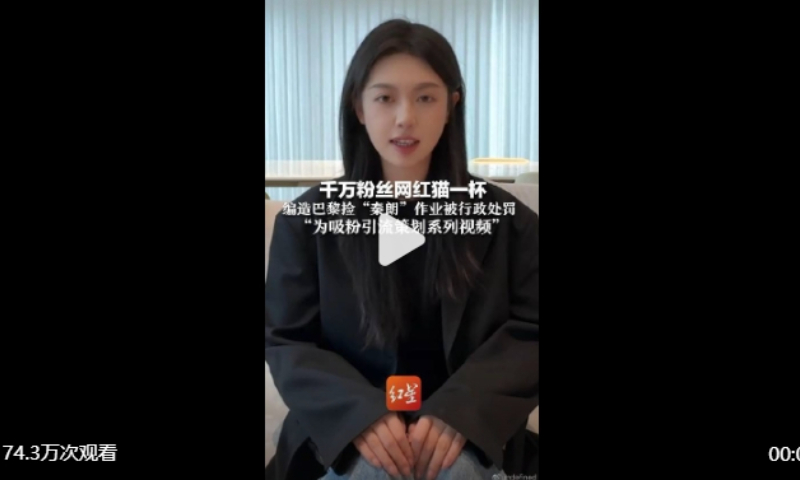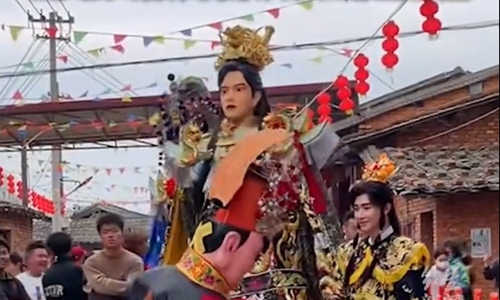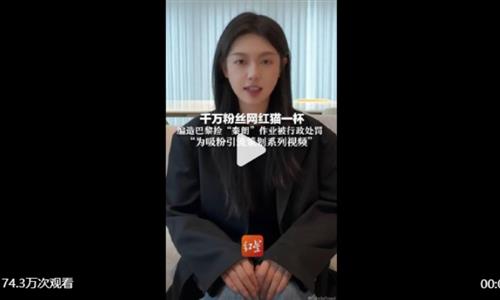
Photo: Screenshot of Red Star News
Several Chinese social media platforms including Sina Weibo, WeChat and Douyin have banned an internet influencer's account for fabricating a false video claiming to have found a student's lost booklets of homework in Paris, which has seriously "damaged the online ecosystem and wasted public resources."
ThurmanMaoyibei, the 29-year-old female internet influencer surnamed Xu, is from Hangzhou, East China's Zhejiang Province, and has more than 10 million followers. On February 16, she posted videos related to "finding a first-grade student named Qin Lang's winter vacation homework in Paris" on social media platforms, quickly attracting widespread attention online.
The next day, a person surnamed Yang from Nantong, East China's Jiangsu Province, impersonated "Qin Lang's uncle" in the video's comment section to attract more attention and spread rumors, triggering a nationwide search for "Qin Lang." On February 19, Xu once again posted a video claiming to have "contacted Qin Lang's mother."
Following an investigation, the police in Hangzhou found that Xu and her 30-year-old colleague, surnamed Xue, had fabricated a series of videos and purchased winter vacation homework books online, to attract viewers, which has caused bad impact. The Hangzhou public security authorities have imposed administrative penalties on the two individuals, and the company involved.
It was found that there were no primary school students at a similar age to "Qin Lang" had left China, which strengthened our confidence that the video in question was spreading false information, according to Zhao Zhichao, a police officer from Hangzhou, the China Central Television reported.
The Cyberspace Administration of China released a notice in July 2023 strengthening the regulation of "self-media," specifying 13 key tasks to address the main complaints of rumors, false information, and other items.
The notice rules that social media platforms should require content containing fictional plots or dramatic interpretations to be clearly "marked with a label indicating fiction or dramatization," Zhu Wei, a vice director of the Communication Law Research Center at the China University of Political Science and Law, told the Global Times on Sunday.
When it came to the case of "Qin Lang," the public didn't know the content was fictional. The blogger who obtained more viewers through illegal means, including not informing users about released videos containing fictional plots, which can result in account suspension, loss of followers and even a permanent ban. Social media platforms may also be held responsibilities for removing any additional fans gained through illegal means, Zhu said.
Xu later apologized via a video and expressed her regret for fabricating and uploading the videos due to her lack of legal awareness.
The topic also gained more than 290 million views via Weibo, with many netizens calling for cleaning up the internet space and the penalties should be given to those who violate the regulations and laws.
"Gaining more viewers online must have minimum standards, and the penalty [in this case] is reasonable," one netizen wrote.
"In addition to strict supervision, social platforms should take on the role of being the primary responsible party for managing internet influencer content," another netizen wrote.
The Ministry of Public Security on Friday disclosed 10 cases, including the case of "Qin Lang lost his winter vocation homework in Paris," which was handled by public security organs in East China's Zhejiang and Jiangsu provinces.
The incident gained a significant amount of public attention and will continue to impact the internet influencer's reputation. She created drama to gain attention and failed to clarify that this content was fabricated, disrupting online public opinion. This incident greatly "disrupted the online public opinion ecosystem" and should be "severely punished," the All-China Journalists Association wrote in an article published on Saturday.
This is not the first time that false content went mainstream. Xu has apologized for her actions, but the association reminded in the article that others need to reflect as well, such as the public, including social media platforms and the media, to reflect on their management systems.
Global Times



